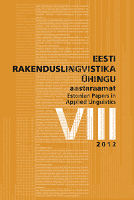Ajasõnad varasel perioodil eesti lapsekeeles
Early development of time adverbs in Estonian child language
Author(s): Sirli ParmSubject(s): Language and Literature Studies
Published by: Eesti Rakenduslingvistika Ühing (ERÜ)
Keywords: first language acquisition; first words; semantics; tense; Estonian
Summary/Abstract: This article discusses the acquisition of the category of time by Estonian children between one and three years of age. The discussion is based on a study of record- ings of Estonian children in the CHILDES database and in the triplets corpus. At the beginning of the acquisition of the category of time there exists only means for expressing present time but before turning three years of age children will also start talking about events that have happened in the past or will happen in the future. A previous study (Argus, Parm 2010) has showed that Estonian children develop a clear distinction between past and non-past; the present tense forms are already understood by four-year-olds while the past and future forms only by six-year-olds. The aim of the study is to find out which time adverbs appear in the speech of a child before the age of three and describe the functions in which these time adverbs occur in the child’s speech.
Journal: Eesti Rakenduslingvistika Ühingu aastaraamat
- Issue Year: 2012
- Issue No: 8
- Page Range: 195-212
- Page Count: 17
- Language: Estonian

